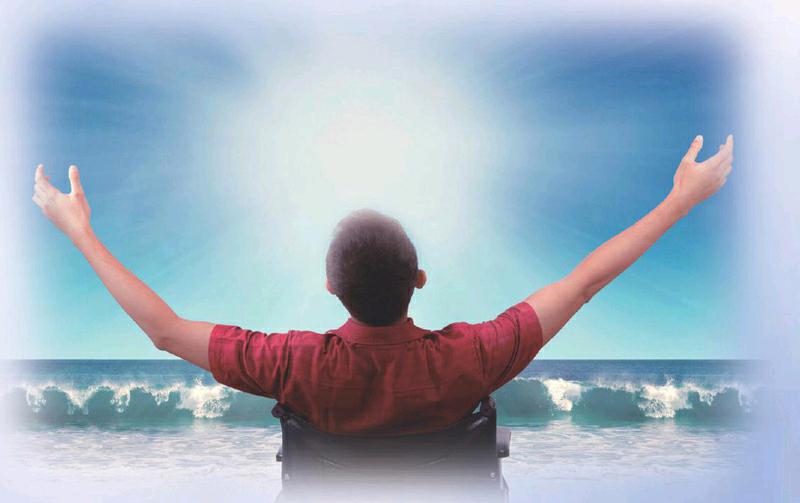一张完美的照片
By+Nell+Wright+++++++张京晋
I was on a vacation on Star Island, but things were different this year. I was in a wheelchair. My legs were paralyzed1) from a rock-climbing accident the previous summer. Angry and frustrated to walk or climb, I wallowed in2) self-pity until my grandma said sternly, "Find another topic, Ben." Unwillingly, I wheeled off to fulfill a photography project for school—an assignment I'd enjoy if I wasn't so unhappy.
Near the hotel, I met an older couple, Susan and Mark. They showed me how to use their folding kayak3) and offered to let me borrow it. "You paddle4) around, and we'll keep our eyes on you." said Mark. They kindly lifted me in and as I paddled toward the headland5), I experienced a sense of excitement; I felt one with water. It's almost the same feeling I used to have while climbing a rock on the island.
This was the same island I had explored on foot, but from the water it seemed entirely new. I wished I hadn't left my camera back at the dock. I wanted to capture the waves falling back toward me off the rocks, and the ducks staring at one another as they rolled up and down the swells6). I saw a seal too far off to photograph, and a pair of funny birds with bright orange beaks7).
Mark started down to the beach. I paddled toward him, keeping the boat across the swells, as Susan had suggested.
"Saw you take on8) water," Mark called from the shore.
Susan waded9) out up to her knees in the water and held the kayak steady for me. "Mark, we should show Ben how to get out when he flips10)."
"This boat can flip?"
"Don't worry. It doesn't happen very often," she said.
Mark rolled up his pants and came into the water. "If she does, stay with the boat for visibility and flotation. Scream your head off11). But first, to get out from under, swivel12) around in the seat, straighten your back and pull yourself toward the stern13)."
He turned me by the shoulders so I could see the stern.
"I get it," I said.
"If we were in warmer water, I'd make you practice. For now, stay close to shore and never go out without someone watching you."
"Yes, Captain." I saluted14).
He gave the boat a little push and hurried out of the icy water.
Susan glanced up toward the hotel. "I hear the tea bell. Take her back to the float, Ben, and we'll meet you."
There went my chance to paddle until I was extremely tired, but Grandma was expecting me for tea. I didn't want Mark or Susan to think I wouldn't do the most responsible thing with their boat, so I headed back to the dock.
Mark and Susan easily helped me into the wheelchair.
"I'm getting you wet," I said. "Sorry."
"No matter to me," Mark said. "If you don't want to get wet, why go to sea?"
"What does that mean?" I asked.
"Something like, it's nothing to get wet. If you choose to spend your time on the ocean, how can you avoid it?"
"I see," I said.
The island had worked on my spirit. It had been a year since I'd felt that there was anything I wanted to do. That afternoon I had actually forgotten about the accident for an hour or two. Was I happy again? Had that short boat ride healed something inside me?
On the following days, we left Susan in one of the big rocking chairs. Or Mark would offer to stay behind, and Susan adventured with me. I took my camera out on a calm day and shot a lot of rocks and birds.
When I got home, I went right to my computer. School started in two days and I had completely forgotten the ninth-grade project, so I had to download and review my photographs. I hoped that I would find something to use, something that wasn't birds, rocks or sunsets. Something that described me.
I thought I must have wasted the first shot; it seemed empty. Curious, I enlarged it. Along the bottom, the float with an empty wheelchair appeared out of the splotches15). Beyond lay the wide harbor with only a hint16) of a line for the kayak, far out on the water. Susan must have taken it on the first day.
It really was me, the spirit part flying away from the wheelchair part.
"Mom, come see my photos!"
She entered my bedroom and stood at my shoulder.
"That's the ferry dock at Star Island." I pointed to the line.
"What's that?" she asked.
"That's me."
"What are you doing?"
"Paddling a kayak. You know, moving on."
我正在星岛度假,但今年情况有所不同:我坐着轮椅,我的双腿因为去年夏天攀岩时发生的一次意外而瘫痪了。我又恼火又沮丧、绝望,不愿意走动或是攀爬,沉溺于自艾自怜之中,直到外婆严肃地对我说:“本,找点别的事儿做。”我心不甘情不愿地摇着轮椅离开,去完成学校的摄影作业——要不是因为心情这么糟糕,这个作业我还是会很乐意去做的。
在酒店附近,我遇到了一对老夫妇——苏珊和马克。他们教我如何使用他们那艘折叠式皮划艇,而且主动提出把皮划艇借给我。“你划着它去转转,我们会看着你的。”马克说。他们体贴地把我抬进了皮划艇内。我划着桨驶向海角,感到一阵兴奋,觉得自己与海水融为了一体。这和我过去在岛上攀岩时的那种感觉几乎一模一样。
这座岛屿是我曾徒步探索过的那座岛,但从海上看过去,它似乎是全新的。我真希望我没把相机留在码头。我想拍下那些击打在岩石上又朝我回落的海浪,还有那些随着涌浪上下起伏而依然相互对望的鸭子们。我看见了一只海豹,它离我太远,相机都无法拍到。我还看到一对奇特的小鸟,它们的喙是亮橙色的。
马克朝着海滩走了下来,按照苏珊教我的,我控制着皮划艇从涌浪中穿过,朝他划了过去。
“看到你和海水较量啦。”马克在岸边喊道。
苏珊艰难地趟过及膝的海水,帮我保持皮划艇的平衡。“马克,我们应该教教本翻船时要怎么逃生。”
“这船会翻?”
“不要担心,这种事不经常发生。”她说。
马克卷起裤腿,走到水里。“如果船真的翻了,就和船待在一起,以便你能浮在水上并能让人看到。然后拼命呼喊。但要想从翻了的船底下挣脱出来,首先你得在座位里转个身,把背挺直,将自己拉向船尾。”
他扶着我的肩膀帮我转了个身,好让我能看到船尾。
“我明白了。”我说。
“要是这水再暖和一点,我就让你练练了。眼下,你就在海岸附近划艇,没人看着你可千万不要出海。”
“是,船长。”我敬了个礼。
他轻轻推了一下皮划艇,急忙走出了冰冷的海水。
苏珊抬头瞥了一眼酒店。“我听到下午茶的铃声了。把船划回浮码头那儿去,本,我们会在那儿接你。”
这下我本来可以划船划到筋疲力尽的机会就没了。不过外婆还在等着我喝茶呢,我也不想让马克和苏珊觉得我对他们的皮划艇连最起码的责任心都没有,所以我朝码头划了回去。
马克和苏珊轻松地帮我坐进了轮椅。
“我害得你们身上都湿了,”我说,“对不起。”
“我没关系啊,”马克说,“如果你不想把身上弄湿,那何必出海呢?”
“这是什么意思呢?”我问。
“意思大概就是弄湿了也没什么大不了。如果你选择去海上玩,你怎么可能不湿身呢?”
“我明白了。”我说。
这座小岛让我振作了起来。一年来我总是觉得没有什么事情是我想做的。那天下午,有那么一两个小时,我竟然忘记了那次意外。我重拾快乐了吗?难道那次短暂的皮划艇之旅治愈了我内心的某些创伤?
接下来的几天里,要么是我们把苏珊留在某个大摇椅里坐着,要么是马克主动提出留下来,让苏珊陪我去冒险。有一天风平浪静,我带了相机出海,拍了很多礁石和鸟儿的照片。
回到家后,我直接来到电脑前。还有两天学校就开学了,而我却把九年级的作业忘了个一干二净,所以我必须把拍的照片下载下来看一遍。我希望可以找到一张能用得上的照片,那上面不是鸟儿、礁石或落日,而是能形容我现在状态的东西。
我以为第一张照片肯定是让我拍废了,因为照片看起来空空如也。出于好奇,我把照片放大。沿着照片底部,那个浮码头从斑斑点点中浮现出来,浮码头上还有一把空的轮椅。远处是宽阔的港口,港口里只有一条细线,那正是在远离海岸水面上的皮划艇。这肯定是苏珊第一天拍的照片。
那真的是我,那个灵魂飞离了轮椅上的我。
“妈妈,来看我的照片!”
妈妈走进我的卧室,站在我的一侧。
“那是星岛的渡船码头。”我指着那条线说。
“那是什么?”她问。
“那是我。”
“你在干吗?”
“划皮划艇。你知道的,乘风破浪。”

